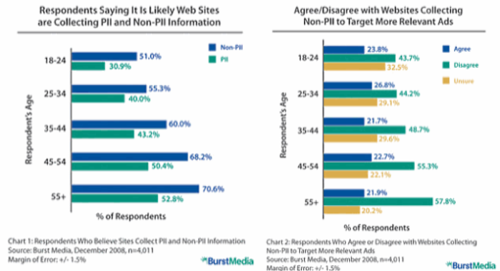According to a recent study by Burst Media, a majority of web users are aware of the fact that a lot of websites and ISPs track, collect, and share information about their online activities. Over 80% of all respondents indicated that they were concerned about online privacy in general, but interestingly, only about half of all respondents under 24 thought that websites collect non-personally identifiable information.

Concern Rises with Age
Only about half of all respondents between 18 and 24 thought that websites were likely to collect non-personally identifiable information, and only a third of 18 to 24 year olds thought that websites were likely to collect personally identifiable data.
70% of older respondent over 55, on the other hand, thought that websites tracked non-personally identifiably information. The study did not find a major differences between how men and women responded to this question.

Exchanging Privacy for Targeted Ads
Burst Media also looked at people’s sentiments about targeted advertising. Only about 23% of all users were willing to give up non-personally identifiable information in return for ads that were better targeted at them. Women (26.7%) were clearly more concerned about this than men (19.9%), and older respondents were more likely to disapprove of websites collecting non-identifiable information in return for more relevant ads.
Internet users regularly push back against behavioral advertising, be it Facebook’s Beacon, Phorm’sdeep packet inspection, or the constant undercurrent of concerns about all the personal data that Google now stores in its data centers. Tim Berners-Lee, the ‘father of the Internet,’ expressed his concerns over this in an interview with the BBC last year. Talking about his data and web history, he said: “It’s mine – you can’t have it. If you want to use it for something, then you have to negotiate with me.” A lot of users clearly share this sentiment, though far too many younger users still seem to be quite unconcerned about it.

















